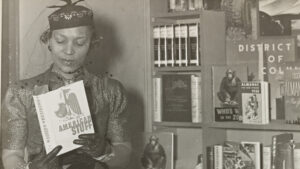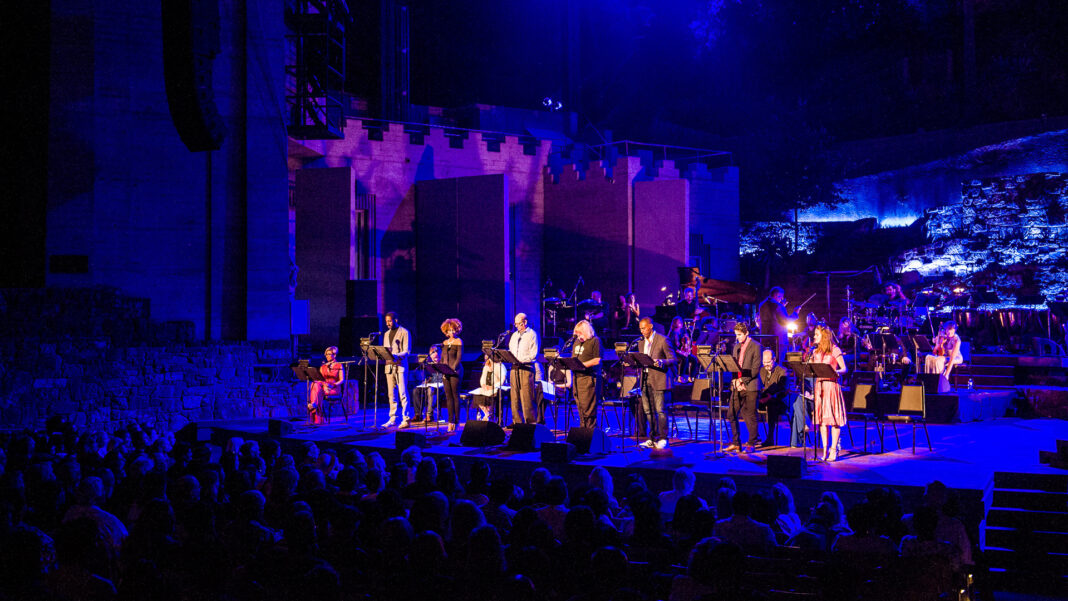This year marks the 20th anniversary of WORDTheatre, a group led by Cedering Fox, that combines text and music to highlight important stories, storytellers and artists. But it was a pivotal event thirteen years ago that helped inform what WORDTheatre does now.
“I met my husband 13 years ago,” Fox revealed. “He’s been in the music business his whole life. He took me to a Nicki Minaj concert at the Staples Center. I’ve been dealing with probably some of the most famous living writers of literature. I’m going to go hear Nicki Minaj with my 20,000 friends. So I’m sitting at this concert and I thought, how do I get these people to be hearing great writing? And I said music and dance.”
From there Fox, along with orchestrator/arranger Jonathan Sacks and music director Starr Parodi, have created shows that employ that very concept. This Saturday they will present JAZZ Re-EVOLUTION at The Ford in Los Angeles. The program will celebrate many of the greatest artists in jazz by combining readings of writings by W.E.B. Du Bois, Zora Neale Hurston, Langston Hughes and Jack Kerouac performed by a cast that includes Maria Bello, Keith David and Glynn Turman with music performed by Terrace Martin, Logan Richardson, Antonique Smith and more.
Last week I spoke via Zoom with Fox, Parodi and Sacks. What follows are excerpts from our conversation that have been edited for length and clarity. To see the full interview, please go to our YouTube channel.
Q: Louis Armstrong is quoted as having said, “If you ask if you have to ask what jazz is, you’ll never know.” And he’s probably right. But in 2023, if someone were to ask each of you what jazz is, what would your response be?
Parodi: Jazz represents freedom because in classical music, if you play the wrong note, you’re making a mistake. But in jazz, if you play not necessarily the right note, you can kind of take it anywhere. And so to me, it’s almost a metaphor for life and the ability to pivot.
Sacks: First of all, I hate defining things. So it’s hard for me to say what jazz is at this point because it’s gone through so much transformation. What it was and what it is and there is this way of playing and that way of playing.

Fox: This is actually my third jazz show. Why I’ve come back to jazz and want to keep letting people know…Antonique Smith, who is singing, was saying that listening to Bessie Smith, she realizes everything she’s doing, everything Whitney Houston, like, they’ve all come through this historical journey and we all stand on the shoulders of these of these icons. To know your history is to be free to create moving forward. That’s why the idea of jazz re-evolution, it’s just the human spirit evolving, making magic.
Q: With WORDTheatre productions Jonathan, you and Starr both have the responsibility of making the music work with the literature. From your perspective, how does the combination of literature and the work that you’re doing allow for an audience to understand who these people were, what this text was, and what the importance of it was?
Sacks: You can talk about Charlie Parker, but what do they sound like? What do they feel like? Words give you a sense of that to a certain extent, but it’s not the same as just hearing it. For me, the hearing is is what’s most important. And so in a show like this, it’s good to put musical color in so it comes alive.
Parodi: I was just talking right before we got on with the sax player that’s going to be playing with us and talking to him about how we’d like for him to do a Charlie Parker solo and kind of improvization under some of the actors speaking. He was so excited about that. I read him the poem that they were talking about and he’s like, “Okay, I have like ten things in mind.” Writers put their hearts into the words, musicians put their hearts into the music. It’s so strong, clear, cohesive and moving to have them both married to each other.
Fox: When Antonique is out there belting Bessie Smith it’s going to send people back to do the research. I am definitely tricking everybody into learning a lot about the history of jazz and about racism. I uncovered stories. I had no idea how Central Avenue got such shut down or how Marilyn Monroe helped Ella Fitzgerald. You don’t have to be an intellectual to come to WORDTheater. You could be the plumber or the president. A great story, well-told, will excite you.
Q: Wayne Shorter was one of the last of a dying breed of jazz legends from what we commonly define as jazz. So if we fast forward 100 years and WORDTheatre is still around and we’re going to be looking back atwhat jazz was in the 2020s, what are your hopes for where jazz will be and where society will be as it relates to these same issues that are being addressed in the show?
Fox: That’s a really challenging question. The world seems to be going backwards as totalitarian dictators are taking over. Ever since we had a Black president, racism, anti-Semitism, all seem to be on the rise. They had Central Avenue thriving as an actually integrated place in California until the [Police] Chief [William H.] Parker came along in the fifties and didn’t like races mingling and put the kibosh on that by taking everybody’s licenses away. And everything that’s happened with female reproductive rights and the onslaught, jazz is the opposite of that.
Now people are being sent back into the shadows. We’re having to fight for things that my mother was on the picket lines for a long time ago. Jazz is not my area of expertise. I’m a storyteller. I’m about the human spirit and stories. But for me, jazz represents this striving to make connection and magic and art, this continually evolving art form that is the triumph over adversity.

Q: In her essay, How It Feels to Be Colored Me, Zora Neale Hurston compared her visceral response, listening to jazz, to the more benign reaction that her white friend who had joined her had to the same music. And she wrote, “I want to slaughter something, give pain, give death. To what? I do not know. But the piece ends. The men of the orchestra wipe their lips and rest their fingers. I creep back slowly to the veneer we call civilization with the last tone and find the white friend sitting motionless in his seat, smoking calmly.” How does your individual work on this WORDTheatre show bridge the gap between those two responses she depicted in that essay?
Sacks: Well, I’m primarily a musician and a music lover, so if the music moves me and it’s interesting and compelling, I don’t care what kind of music it is. I don’t care who’s doing it. If I’ve made myself open to it, then what’s the problem?
Parodi: I was touring with George Howard, who is a jazz/pop saxophonist, and we were opening for Whitney Houston, touring around the country on her first tour. I was the only girl in the band and the only Caucasian. I remember traveling through the South with them and we were driving through an area where it was obviously some sharecropper’s cabins along with some mansions. This is in the late eighties. This is my first tour. I didn’t know what they were talking about or why they were getting so mad or why they were so upset. I feel like it was such an education for them to share with me their feelings.
I can understand how one person can feel a certain way and one person can feel another way from the same thing. A lot of it has to do with education and communication. I think that just highlights more reason for people to hear stories, to hear music, to talk with each other, to get off their phones, to get out of there.
Fox: I use that in the piece and the tagline is the white guy goes “Good music they have here.” She’s had this entire history of the African-American experience coursing through her veins. I use that because there will be aha moments for people who go “good music they have here.” It is good music they have there. But I feel that my job is to really have people experience on a visceral level the history of these extraordinary men and women who made this magic through all the challenges. It is life affirming music, but it is wrought with blood and pain. To get some white people to stop and think about that in a different way because this historical context is woven through the entire piece. Then the music tricks you into getting with the program a little.
To see the full WordTHEATRE interview with Cedering Fox, Starr Parodi and Jonathan Sacks, please go here.
Main Photo: From WORDTheatre’s In the Cosmos in 2017 (Courtesy Los Angeles Philharmonic Association)











